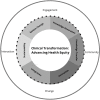Curricular Interventions in Medical Schools: Maximizing Community Engagement Through Communities of Practice
- PMID: 36849475
- PMCID: PMC9970673
- DOI: 10.1370/afm.2925
Curricular Interventions in Medical Schools: Maximizing Community Engagement Through Communities of Practice
Abstract
This article explains the importance of a communities of practice (CoP) model for continually aligning medical education and clinical transformation with contemporary health issues. It describes the evolution and advantages of using CoP as a model for transforming medical education and clinical practice and applies the CoP methodology to addressing the changing needs of socially vulnerable populations (LGBTQ [lesbian, gay, bisexual, transgender, and queer/questioning], persons experiencing homelessness, and migrant farm workers). In conclusion, this article describes CoP-led activities, achievements, and value creation in medical education by the National Center for Medical Education Development and Research established at the Meharry Medical College.
Keywords: communities of practice; medical education, systematic review; primary care; vulnerable populations, LGBTQ.
© 2023 Annals of Family Medicine, Inc.
Conflict of interest statement
Conflicts of interest: authors report none.
Figures


References
Publication types
MeSH terms
LinkOut - more resources
Full Text Sources
